The film reviews take a back seat for the next two weeks (even though I'll post a review of The Science of Sleep sometime soon) as the NCAA basketball tournament begins tonight with things getting into full swing on Thursday. Living relatively close to Syracuse, the Orange have always been my favorite team and it's downright robbery that they were left out in favor of goobers like Arkansas and Illinois, who I'm sure that Syracuse could beat both easily. Overall, I think this was the worst tournament I can remember; anyone on this year's selection committee should be barred from college basketball forever. Want a list of things they did wrong?
-no Syracuse, Kansas State and Drexel but Arkansas, Illinois, and Stanford
-Butler as a no. 5 seed when they've stunk for the past month.
-Washington State a 3 and Texas a 4 having to play UNC
-shafting the Big East in general
Anyway, here are my picks:
East Regional: Texas over Georgetown
Upset Special: Texas over UNC and Georgetown
South Regional: Ohio State over Nevada
Upset Special: Nevada over Memphis and Texas A&M, Albany over Virginia
Midwest Regional: Florida over Oregon
Upset Special: Old Dominion over Butler
West Regional: UCLA over Kansas
Upset Special: VCU over Duke
Final Four: UCLA over Florida
Ohio State over Texas
UCLA over Ohio State
Tuesday, March 13, 2007
Saturday, March 10, 2007
The Prestige

The Prestige (Christopher Nolan, 2006) [10]
Very often the film that I pick for the best of a certain year is a film that gets solid reviews by most critics, but is never a film that finds its way onto many critics' lists or awards (Munich kinda sorta being the exception). This film, barring there are many more strong contenders out there (and from what I deduce, there may not be), will be my pick for Useless Film Snob Reviews' Best Film of 2006. While I may be too wowed by it after just seeing it, Christopher's Nolan film of magic, jealousy, and macho one-upmanship is a dazzling piece of filmmaking.
Nolan is always a story focused filmmaker and this film contains some of the same high-wire writing and plot twists that made me a fan of his with Memento. The story focuses on the careers of two magicians, Angier the gifted showman played by Hugh Jackman and Borden, the better magician played by Christian Bale. The film revolves around the rival career arcs of the two men and the macho posturing and sabotaging of each by the other, all the result of a tragic accident that I don't want to reveal for anyone who hasn't seen the film. Nolan really focuses on the two men and their collision of egos which does cause the peripheral story elements to fall back. The magicians' motivations are so interesting that the lack of a strong surrounding story doesn't become an issue for me. The performances all around are good, especially Bale who comes across much more menacing than Jackman's character and Michael Caine is a great supporting role. The Scarlett Johansson character comes and goes without much thought but then again this really about the magicians and the role of magic.
I could go into a long discussion about the role of magic and its collision with science in the Victorian Era and its relation to reality and the importance of illusion but I don't want to sit here all day. (It would make a great paper though). Let's just say it creates a really interesting story with enough twists that rival any illusion or trick performed in the film. Nolan is often credited as being a very story focused writer and director but here, the visuals really appeal. The film deals very much in dark/bright contrasts but still manages to create a warmth as well as a coldness when the film needs it. On the entire filmmaker spectrum, The Prestige is the most accomplished film Nolan has made to date and a film that I have great respect for.
Very often the film that I pick for the best of a certain year is a film that gets solid reviews by most critics, but is never a film that finds its way onto many critics' lists or awards (Munich kinda sorta being the exception). This film, barring there are many more strong contenders out there (and from what I deduce, there may not be), will be my pick for Useless Film Snob Reviews' Best Film of 2006. While I may be too wowed by it after just seeing it, Christopher's Nolan film of magic, jealousy, and macho one-upmanship is a dazzling piece of filmmaking.
Nolan is always a story focused filmmaker and this film contains some of the same high-wire writing and plot twists that made me a fan of his with Memento. The story focuses on the careers of two magicians, Angier the gifted showman played by Hugh Jackman and Borden, the better magician played by Christian Bale. The film revolves around the rival career arcs of the two men and the macho posturing and sabotaging of each by the other, all the result of a tragic accident that I don't want to reveal for anyone who hasn't seen the film. Nolan really focuses on the two men and their collision of egos which does cause the peripheral story elements to fall back. The magicians' motivations are so interesting that the lack of a strong surrounding story doesn't become an issue for me. The performances all around are good, especially Bale who comes across much more menacing than Jackman's character and Michael Caine is a great supporting role. The Scarlett Johansson character comes and goes without much thought but then again this really about the magicians and the role of magic.
I could go into a long discussion about the role of magic and its collision with science in the Victorian Era and its relation to reality and the importance of illusion but I don't want to sit here all day. (It would make a great paper though). Let's just say it creates a really interesting story with enough twists that rival any illusion or trick performed in the film. Nolan is often credited as being a very story focused writer and director but here, the visuals really appeal. The film deals very much in dark/bright contrasts but still manages to create a warmth as well as a coldness when the film needs it. On the entire filmmaker spectrum, The Prestige is the most accomplished film Nolan has made to date and a film that I have great respect for.
Saturday, March 03, 2007
L'Enfant

L'Enfant (Jean-Pierre and Luc Dardenne, 2006) [6]
It's interesting that the title plays such a dual role in this film; it can be seen literally about the baby that Bruno and Sonia have to care for, or the way I see it, it really describes the character of Bruno himself. The Dardenne brothers focus the film squarely on his shoulders, focusing on a character that is still stuck in an arrested adolescence and is forced to now have to care for a child himself. Formally, the brothers focus on the daily existence of the characters, painting a sociological picture that can create a situation where a character like Bruno would consider selling his newborn son the same as try to sell a stolen camera. The baby itself doesn't quite come across for me as a real character; it never cries or seems to need anything. While that may not be such an important point for the Dardennes as their focus isn't on the baby, to me it leaves something lacking. From an aesthetic standpoint, the film does a very good job of expressing a certain setting, and I really like how the brothers spend a lot of time showing Bruno and Sonia pushing the stroller around. Visually, the film is very much in tune with what it wants to say. Emotionally, I can't really say the same thing. The Dardennes have stated this is a love story, but with the exception of the last scene, I don't see it. That scene has to much compassion in it for a film for the most of it, keeps its distance emotionally. I felt that the Bruno character was too cold and calculating, only concerned with getting money. For him to have a revelation by being placed in jail muddles what was a solid film, but by no means a masterpiece as some critics have done.
It's interesting that the title plays such a dual role in this film; it can be seen literally about the baby that Bruno and Sonia have to care for, or the way I see it, it really describes the character of Bruno himself. The Dardenne brothers focus the film squarely on his shoulders, focusing on a character that is still stuck in an arrested adolescence and is forced to now have to care for a child himself. Formally, the brothers focus on the daily existence of the characters, painting a sociological picture that can create a situation where a character like Bruno would consider selling his newborn son the same as try to sell a stolen camera. The baby itself doesn't quite come across for me as a real character; it never cries or seems to need anything. While that may not be such an important point for the Dardennes as their focus isn't on the baby, to me it leaves something lacking. From an aesthetic standpoint, the film does a very good job of expressing a certain setting, and I really like how the brothers spend a lot of time showing Bruno and Sonia pushing the stroller around. Visually, the film is very much in tune with what it wants to say. Emotionally, I can't really say the same thing. The Dardennes have stated this is a love story, but with the exception of the last scene, I don't see it. That scene has to much compassion in it for a film for the most of it, keeps its distance emotionally. I felt that the Bruno character was too cold and calculating, only concerned with getting money. For him to have a revelation by being placed in jail muddles what was a solid film, but by no means a masterpiece as some critics have done.
Wednesday, February 28, 2007
The Films of Kenneth Anger, Volume 1

It's nice to see that Netflix offers this as experimental films are often too hard to find on DVD. Also, it's also great that Anger's films have been put together on a DVD set, seeing that his style has had a profound impact on later directors. His filmmaking style, a lot of repetition and pans, as well as his thought out use of a rock and roll soundtrack clearly have a huge influence on Martin Scorsese as well as others. I only do have a limited knowledge of experimental film, but from what I've seen, I would have to say that Anger is my favorite and most exciting experimental filmmaker. He has more of a sense of humor than Brakhage, and his films, especially Scorpio Rising, have more vitality to me than most avant-garde work.
Volume 1 covers Anger's early work, from Fireworks in 1947 to Inauguration of the Pleasure Dome in 1954. These films predate the notoriety he would get in the late 60s with Scorpio Rising but they still feature the use of repetition and focus that would define his work. Anger's films focus very strongly on images, and the dream like way that they appear throughout his films. Even though they may be dream like, they never seem totally random or pointless. There's always a great deal of thought put into trying to convey the right expression. It may not be completely clear all of the time, but it creates films that are definitely unique.
Fireworks (1947) [7]
The most expressive and perhaps the most inaccessible film of Anger's, this film to me has a fever dream feel to it. Dealing heavily with the themes of homosexuality, masochism, and rape, it may turn off people but it shows the talent that Anger had in creating arresting visuals. A young man enter a bathroom only to be brutally raped and beaten by a group of sailors only to find a sort of masochistic awakening, it is still a daring film, sixty years later.
Puce Moment (1949) [5]
A five minute short that Anger said was meant to be an homage to the silent film era. It starts off strong with an opening fixed shot of a shuffle of evening gowns (it's a lot stronger image than it sounds like), the film just doesn't go on long enough to gain any real lasting power in my mind.
Rabbit's Moon (1950) [6]
My introduction to Anger came while I was at the University at Buffalo, and I saw a modified nine minute version of this, which not many places had. The version here is the sixteen minute original that Anger officially released in 1971 even though all the footage was shot in France in 1950. This is the first film to feature what I would consider the rock and roll soundtrack that would be so influential to people like Scorsese. The film itself deals with the idea of a Japanese fairy tale that a rabbit lives in the moon. The narrative doesn't really move anywhere, but the interesting use of repetition and zooms make it appealing.
Eaux d'Artifice (1953) [9]
The most visually arresting of this group of films, Anger filmed the water gardens at Villa d'Este and emerged with one of the most sublime and well-crafted films of his. He uses a midget actress, Carmilla Salvatorelli, to skew the perspective of the film, to make the fountains imposing upon the figure, when in reality, they aren't. Anger also filmed everything using a red filter then printed the film with a blue one to give a unique and arresting pall to the picture. The ending's crescendo of water adds to its arresting nature.
Inauguration of the Pleasure Dome (1954) [6]
While this film may win an award for best title ever for a film, it was a little underwhelming for me. Influenced heavily by the ideas of occultist Alasteir Crowley, the film is a mash of odd images that still manage to feel like they have a purpose. I would consider this one of Anger's most dreamlike films, and while I may be wrong, the film feels like I'm watching someones dream. The film does have an interesting use of superimposition and the portrayal of the ritual, something that is done in depth in Scorpio Rising. Let's hope that Volume 2 isn't far behind.
Volume 1 covers Anger's early work, from Fireworks in 1947 to Inauguration of the Pleasure Dome in 1954. These films predate the notoriety he would get in the late 60s with Scorpio Rising but they still feature the use of repetition and focus that would define his work. Anger's films focus very strongly on images, and the dream like way that they appear throughout his films. Even though they may be dream like, they never seem totally random or pointless. There's always a great deal of thought put into trying to convey the right expression. It may not be completely clear all of the time, but it creates films that are definitely unique.
Fireworks (1947) [7]
The most expressive and perhaps the most inaccessible film of Anger's, this film to me has a fever dream feel to it. Dealing heavily with the themes of homosexuality, masochism, and rape, it may turn off people but it shows the talent that Anger had in creating arresting visuals. A young man enter a bathroom only to be brutally raped and beaten by a group of sailors only to find a sort of masochistic awakening, it is still a daring film, sixty years later.
Puce Moment (1949) [5]
A five minute short that Anger said was meant to be an homage to the silent film era. It starts off strong with an opening fixed shot of a shuffle of evening gowns (it's a lot stronger image than it sounds like), the film just doesn't go on long enough to gain any real lasting power in my mind.
Rabbit's Moon (1950) [6]
My introduction to Anger came while I was at the University at Buffalo, and I saw a modified nine minute version of this, which not many places had. The version here is the sixteen minute original that Anger officially released in 1971 even though all the footage was shot in France in 1950. This is the first film to feature what I would consider the rock and roll soundtrack that would be so influential to people like Scorsese. The film itself deals with the idea of a Japanese fairy tale that a rabbit lives in the moon. The narrative doesn't really move anywhere, but the interesting use of repetition and zooms make it appealing.
Eaux d'Artifice (1953) [9]
The most visually arresting of this group of films, Anger filmed the water gardens at Villa d'Este and emerged with one of the most sublime and well-crafted films of his. He uses a midget actress, Carmilla Salvatorelli, to skew the perspective of the film, to make the fountains imposing upon the figure, when in reality, they aren't. Anger also filmed everything using a red filter then printed the film with a blue one to give a unique and arresting pall to the picture. The ending's crescendo of water adds to its arresting nature.
Inauguration of the Pleasure Dome (1954) [6]
While this film may win an award for best title ever for a film, it was a little underwhelming for me. Influenced heavily by the ideas of occultist Alasteir Crowley, the film is a mash of odd images that still manage to feel like they have a purpose. I would consider this one of Anger's most dreamlike films, and while I may be wrong, the film feels like I'm watching someones dream. The film does have an interesting use of superimposition and the portrayal of the ritual, something that is done in depth in Scorpio Rising. Let's hope that Volume 2 isn't far behind.
Sunday, February 25, 2007
Babel

Babel (Alejandro Gonzalez Innaritu, 2006) [4]
With tonight being the Oscars, there's no doubt that this will edge out a win for Best Picture because it has all the facets of Hollywood liberal guilt syndrome that made Crash appealing. That's not to say that this is as bad and manipulative as Crash; Innaritu is a much more talented director than Paul Haggis and his virtuosity cover up some of the more illogical elements of this film. Even though, it doesn't have as many differences as similarities: the film especially towards the end becomes more and more emotionally manipulative (the nanny's ordeal with customs, Brad Pitt playing the Ugly American) and its cut and paste way of tying the disparate story lines together, which is highly irrational. Innaritu and writer Guillermo Arriaga also have big ideas to throw around (global interconnectivity, the futility of language, the persistence of human agony, and so on) but never really form them into any coherent statement. The only part of the film that gets above is the Japanese storyline mostly because the Richo Kikuchi character, as a deaf mute, exists outside all of Innaritu's big idea garbage, and for that time, we get scenes with real character motivation and development that show the promise that Babel and Innaritu have. Too bad he lets the rest of the film mess that up.
The truth is I liked Innaritu's previous films, especially 21 Grams and I do think that he has true talent as a filmmaker. The biggest problem with Babel is that he gets himself bogged down into thinking he's conveying great truths about a global culture that is more interconnected than the average person would happen to believe. What comes out is a muddled film that has some really good moments but never gets itself above its illogical connections and liberal guilt-tripping. Which means, sadly, it will probably win Best Picture.
By the way, if anyone has read my posts from last year, I said if Crash won Best Picture, I would boycott watching the Oscars for eternity. I'm going to keep my word; I don't care anymore. My only hope is that Martin Scorsese, after he wins for best director, realizes that Oscars don't validate his career. Hell, the man lost to Kevin Costner and John Avildsen in the past. That tells you all you need to know.
With tonight being the Oscars, there's no doubt that this will edge out a win for Best Picture because it has all the facets of Hollywood liberal guilt syndrome that made Crash appealing. That's not to say that this is as bad and manipulative as Crash; Innaritu is a much more talented director than Paul Haggis and his virtuosity cover up some of the more illogical elements of this film. Even though, it doesn't have as many differences as similarities: the film especially towards the end becomes more and more emotionally manipulative (the nanny's ordeal with customs, Brad Pitt playing the Ugly American) and its cut and paste way of tying the disparate story lines together, which is highly irrational. Innaritu and writer Guillermo Arriaga also have big ideas to throw around (global interconnectivity, the futility of language, the persistence of human agony, and so on) but never really form them into any coherent statement. The only part of the film that gets above is the Japanese storyline mostly because the Richo Kikuchi character, as a deaf mute, exists outside all of Innaritu's big idea garbage, and for that time, we get scenes with real character motivation and development that show the promise that Babel and Innaritu have. Too bad he lets the rest of the film mess that up.
The truth is I liked Innaritu's previous films, especially 21 Grams and I do think that he has true talent as a filmmaker. The biggest problem with Babel is that he gets himself bogged down into thinking he's conveying great truths about a global culture that is more interconnected than the average person would happen to believe. What comes out is a muddled film that has some really good moments but never gets itself above its illogical connections and liberal guilt-tripping. Which means, sadly, it will probably win Best Picture.
By the way, if anyone has read my posts from last year, I said if Crash won Best Picture, I would boycott watching the Oscars for eternity. I'm going to keep my word; I don't care anymore. My only hope is that Martin Scorsese, after he wins for best director, realizes that Oscars don't validate his career. Hell, the man lost to Kevin Costner and John Avildsen in the past. That tells you all you need to know.
Tuesday, February 20, 2007
The Departed

The Departed (Martin Scorsese, 2006) [9]
Sure, this doesn't rank up there with Raging Bull or Goodfellas in terms of a crowning work of cinematic achievement, but after the relative bore of his last two films, Scorsese returns with something close to what I expect out of a Martin Scorsese picture. This is his best work since Goodfellas, and it sources the same material of that film but plays it differently. This seems more like a pure work of entertainment, and while I never like film purely as entertainment, I have to say this was one enjoyable film to watch. The film has all the filmic trademarks of a Scorsese picture: the kinetic violence, fast-paced editing, and great choice of a rock and roll soundtrack. If a film has that, it's going to be hard for me to not like it.
For the film itself, William Monahan's screenplay crackles with sharp dialogue and definitely has a keen grasp of Boston, all the way down to the institutionalized racism of the (mostly) Irish Catholic citizens. Both Monahan and Scorsese do a great job of handling the interwoven stories of the two "rats" so that it doesn't become muddled. The most interesting feature of the film is the duplicity of the Damon and DiCaprio characters, how they both exist on the same level of being, yet still manage to remain distinct individuals. They have the same task, they have the same admiration of their superiors, and they even manage to be romantically involved with the same woman. For all its action and suspense, the film really hinges on the credibility of these two characters being practically one in the same. For all the tricks Scorsese pulled out of the bag for this one, it never clouds that issue.
That being said, all the tricks Scorsese uses are better than what 98% of all other directors would have done with the material. Some credit has Thelma Schoonmaker, Scorsese's long time editor, for reigning in what could have been overly excessive, most notably Nicholson's character. There are times when you can sense Jack's doing his Jack routine, but it never manages to spoil the film. Also, the Vera Famiga character doesn't come across with same conviction as the male characters, which isn't that surprising seeing that Scorsese's films excel in a male universe. Even with that being said, The Departed is definitely a contender for my best of '06. It's not quite vintage Scorsese, but anything close is still pretty good.
Sure, this doesn't rank up there with Raging Bull or Goodfellas in terms of a crowning work of cinematic achievement, but after the relative bore of his last two films, Scorsese returns with something close to what I expect out of a Martin Scorsese picture. This is his best work since Goodfellas, and it sources the same material of that film but plays it differently. This seems more like a pure work of entertainment, and while I never like film purely as entertainment, I have to say this was one enjoyable film to watch. The film has all the filmic trademarks of a Scorsese picture: the kinetic violence, fast-paced editing, and great choice of a rock and roll soundtrack. If a film has that, it's going to be hard for me to not like it.
For the film itself, William Monahan's screenplay crackles with sharp dialogue and definitely has a keen grasp of Boston, all the way down to the institutionalized racism of the (mostly) Irish Catholic citizens. Both Monahan and Scorsese do a great job of handling the interwoven stories of the two "rats" so that it doesn't become muddled. The most interesting feature of the film is the duplicity of the Damon and DiCaprio characters, how they both exist on the same level of being, yet still manage to remain distinct individuals. They have the same task, they have the same admiration of their superiors, and they even manage to be romantically involved with the same woman. For all its action and suspense, the film really hinges on the credibility of these two characters being practically one in the same. For all the tricks Scorsese pulled out of the bag for this one, it never clouds that issue.
That being said, all the tricks Scorsese uses are better than what 98% of all other directors would have done with the material. Some credit has Thelma Schoonmaker, Scorsese's long time editor, for reigning in what could have been overly excessive, most notably Nicholson's character. There are times when you can sense Jack's doing his Jack routine, but it never manages to spoil the film. Also, the Vera Famiga character doesn't come across with same conviction as the male characters, which isn't that surprising seeing that Scorsese's films excel in a male universe. Even with that being said, The Departed is definitely a contender for my best of '06. It's not quite vintage Scorsese, but anything close is still pretty good.
Thursday, February 15, 2007
A Scanner Darkly

A Scanner Darkly (Richard Linklater, 2006) [5]
Let's make this review short and sweet: I just never really got into this. The rotoscoping enhances the cloud of paranoia that encircles the film really well, and the ideas brought up (drug addiction, government surveillance, paranoia, the loss of the self) are all interesting but somehow that didn't translate into a coherent work for me. The one theme that keeps popping up when thinking about this film is Foucault's writings on the penopticon and the power of self-surveillance. One of the main themes of the film is that everybody is watching everybody, but for those who didn't take literary theory, it doesn't mean that much. I felt the performances, with the exception of Robert Downey Jr., were pretty much lackluster. My main problem stems from the fact that there's not much here in terms of images or performances that manage to stick in my mind. Now Linklater may have purposely done this, keeping everything so matter of fact, and it does work in regards to the world of the film and what Philip K. Dick was attempting to get across. But for the film as a whole, it seems to mirror its main characters in a foggy, deadened state.
Let's make this review short and sweet: I just never really got into this. The rotoscoping enhances the cloud of paranoia that encircles the film really well, and the ideas brought up (drug addiction, government surveillance, paranoia, the loss of the self) are all interesting but somehow that didn't translate into a coherent work for me. The one theme that keeps popping up when thinking about this film is Foucault's writings on the penopticon and the power of self-surveillance. One of the main themes of the film is that everybody is watching everybody, but for those who didn't take literary theory, it doesn't mean that much. I felt the performances, with the exception of Robert Downey Jr., were pretty much lackluster. My main problem stems from the fact that there's not much here in terms of images or performances that manage to stick in my mind. Now Linklater may have purposely done this, keeping everything so matter of fact, and it does work in regards to the world of the film and what Philip K. Dick was attempting to get across. But for the film as a whole, it seems to mirror its main characters in a foggy, deadened state.
Tuesday, February 13, 2007
Bonnaroo Lineup Leaked
This is confirmed through numerous sources. It's the real deal! And while I'm not too thrilled about the choice of headliners and no Arcade Fire or Shins (hopefulley, at least not yet), there's enough here to get me all giddy for June.
2007 Bonnaroo Music and Arts Festival Confirmed Artists:
The Police
Tool
Widespread Panic
The White Stripes
Ben Harper & the Innocent Criminals
Wilco (Yeah!)
The Flaming Lips (Yeah!)
Manu Chao
The String Cheese Incident
Franz Ferdinand
Bob Weir & Ratdog
Damien Rice (Yeah)
Ween
Gov't Mule
Ziggy Marley & the Melody Makers (Yeah!)
The Decemberists (Yeah!)
Kings of Leon
Michael Franti & Spearhead
Wolfmother
Regina Spektor
Galactic
The Black Keys (Yeah!)
DJ Shadow
Gillian Welch & David Rawlings (Yeah!)
Spoon (Yeah!)
Keller Williams (WMD's)
Sasha & John Digweed
STS9
Old Crow Medicine Show (Yeah!)
The Hold Steady (Yeah!)
North Mississippi Allstars (Yeah!)
Fountains Of Wayne
Hot Tuna (Yeah!)
Feist (Yeah!!)
Hot Chip
Lily Allen
John Butler Trio
Ralph Stanley & the Clinch Mountain Boys
Aesop Rock
The Richard Thompson Band (Yeah!)
Dierks Bentley
Xavier Rudd
Gogol Bordelo
Junior Brown
Tortoise
T-Bone Burnett
Mavis Staples (Yeah!!!!!!)
Clutch
Cold War Kids(Yeah!)
Dr. Dog
Paolo Nutini
Brazilian Girls
RX Bandits
The Nightwatchman
The Slip (Yeah!)
Girl Talk
Railroad Earth (Yeah!)
Martha Wainwright
Rodrigo y Gabriela
Annuals
Tea Leaf Green (Yeah!)
Sam Roberts Band (Yeah!)
Elvis Perkins in Dearland
Charlie Louvin
Sonya Kitchell
Mute Math
Apollo Sunshine
Uncle Earl
James Blood Ulmer
The National
The Little Ones
Ryan Shaw
That's a lot of yeahs. Add to that Lewis Black, David Cross, and Dave Attell in the comedy and I already got too many decisions to make. "Tennessee, Tennesse, ain't no place I'd rather be..."
2007 Bonnaroo Music and Arts Festival Confirmed Artists:
The Police
Tool
Widespread Panic
The White Stripes
Ben Harper & the Innocent Criminals
Wilco (Yeah!)
The Flaming Lips (Yeah!)
Manu Chao
The String Cheese Incident
Franz Ferdinand
Bob Weir & Ratdog
Damien Rice (Yeah)
Ween
Gov't Mule
Ziggy Marley & the Melody Makers (Yeah!)
The Decemberists (Yeah!)
Kings of Leon
Michael Franti & Spearhead
Wolfmother
Regina Spektor
Galactic
The Black Keys (Yeah!)
DJ Shadow
Gillian Welch & David Rawlings (Yeah!)
Spoon (Yeah!)
Keller Williams (WMD's)
Sasha & John Digweed
STS9
Old Crow Medicine Show (Yeah!)
The Hold Steady (Yeah!)
North Mississippi Allstars (Yeah!)
Fountains Of Wayne
Hot Tuna (Yeah!)
Feist (Yeah!!)
Hot Chip
Lily Allen
John Butler Trio
Ralph Stanley & the Clinch Mountain Boys
Aesop Rock
The Richard Thompson Band (Yeah!)
Dierks Bentley
Xavier Rudd
Gogol Bordelo
Junior Brown
Tortoise
T-Bone Burnett
Mavis Staples (Yeah!!!!!!)
Clutch
Cold War Kids(Yeah!)
Dr. Dog
Paolo Nutini
Brazilian Girls
RX Bandits
The Nightwatchman
The Slip (Yeah!)
Girl Talk
Railroad Earth (Yeah!)
Martha Wainwright
Rodrigo y Gabriela
Annuals
Tea Leaf Green (Yeah!)
Sam Roberts Band (Yeah!)
Elvis Perkins in Dearland
Charlie Louvin
Sonya Kitchell
Mute Math
Apollo Sunshine
Uncle Earl
James Blood Ulmer
The National
The Little Ones
Ryan Shaw
That's a lot of yeahs. Add to that Lewis Black, David Cross, and Dave Attell in the comedy and I already got too many decisions to make. "Tennessee, Tennesse, ain't no place I'd rather be..."
Monthly Listening Post - February 2007
It is only halfway through the month, but there have been so many new releases since I've posted the last listening post that I would forget some if I didn't do anything now. The amount of new stuff is right up there with any month since I began doing this:
1) VietNam - VietNam (this is the early front-runner for my favorite album of 2007)
2) The Shins - Wincing the Night Away (a much more musically interesting album than the previous two)
3) The Broken West - I Can't Go On, I'll Go On
4) Of Montreal - Hissing Fauna, Are You the Destroyer?
5) Various Artists - Endless Highway: The Music of the Band (My Morning Jacket nail 'It Makes No Difference')
6) Explosions In the Sky - Those Who Tell the Truth Shall Die, Those Who Tell the Truth Shall Live Forever (I just got into this band so I'm going with older material)
7) The Arcade Fire - Neon Bible (this isn't out yet, but come on, it's not that hard to find
Up here in the Norheast, we're expecting a big snowstorm into tomorrow which would normally grab my attention except tomorrow is Bonnaroo Lineup Announcement Day. The Police have already spilled the beans and are the Saturday night headliner. I'm not that big a fan but for the same price as paying for a single Police show on their upcoming tour, I can see them with a whole bunch of other acts for an entire weekend. I just have a feeling this year is going to be the best lineup ever. We'll just have to see tomorrow morning.
1) VietNam - VietNam (this is the early front-runner for my favorite album of 2007)
2) The Shins - Wincing the Night Away (a much more musically interesting album than the previous two)
3) The Broken West - I Can't Go On, I'll Go On
4) Of Montreal - Hissing Fauna, Are You the Destroyer?
5) Various Artists - Endless Highway: The Music of the Band (My Morning Jacket nail 'It Makes No Difference')
6) Explosions In the Sky - Those Who Tell the Truth Shall Die, Those Who Tell the Truth Shall Live Forever (I just got into this band so I'm going with older material)
7) The Arcade Fire - Neon Bible (this isn't out yet, but come on, it's not that hard to find
Up here in the Norheast, we're expecting a big snowstorm into tomorrow which would normally grab my attention except tomorrow is Bonnaroo Lineup Announcement Day. The Police have already spilled the beans and are the Saturday night headliner. I'm not that big a fan but for the same price as paying for a single Police show on their upcoming tour, I can see them with a whole bunch of other acts for an entire weekend. I just have a feeling this year is going to be the best lineup ever. We'll just have to see tomorrow morning.
Saturday, February 10, 2007
An Inconvenient Truth
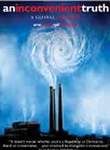
An Inconvenient Truth (Davis Guggenheim, 2006) [7]
This site is meant to be my two-bit reviews of films released months ago; this isn't really about political discourse, something that at one time I had interests in but am now so sick of with all the shrieking hyenas on 24-hour cable news that I've become cynical of any thing that smacks of propaganda, from the right or the left. I've stated before that I'm very liberal, but didn't particularly care for the shrill tactics of Fahrenheit 9/11 or the cheap, pandering faux-liberalism of Hollywood shown in Crash. I didn't vote for Al Gore in 2000; I voted for Nader mostly because I felt Gore wasn't liberal enough on some (most) positions. I had the feeling that this film, a shoo-in for Best Documentary, was only a way for Gore to suck up to the hardcore liberals after abandoning them for the center.
There, I got all of my political baggage out of the way. As for this film, it isn't great in terms of cinema, but it does have an important, sobering message that actually makes Al Gore show traits of being a human being. The information in this film could have been portrayed a little better; at times it still feels too much like the viewpoint is skewed for left-leaning audiences. I'm not going to call it bias as all the conservative weasels would like their followers to believe. There is no denying that the information that Gore covers in the films is pretty near scientific fact: the earth is warming because of carbon emissions in the atmosphere and it is most certainly the result of human activity. Anyone douchebag that tries the whole "this is just cyclical climate change, there's no hard proof of global warming" should have to watch this A Clockwork Orange style, so when they hear someone like Limbaugh or Hannity start spewing nonsense it makes it want to puke, like the rest of rational society. When a worldwide committee of scientists released a report in the last week saying essentially the same points Gore raises in the film, it raises it above bias, doesn't it?....See, it's impossible for me to review this film without bringing my politics into it. That's the greatest weakness of the film is that those who happen to be on the opposite end of the political spectrum won't pay attention to important scientific information simply because it's Al Gore as the messenger. This film's message should be listened to by everyone, because at its essence, we owe it to future generations if 1/3 of what is being predicted actually occurs. That a good number of people, a good many of them in the Republican Party and the current administration, choose to ignore information that a majority of the rest of the world acknowledges and is trying to do something about, make me be ashamed to be an citizen of the United States.
By the way, the film would be a lot stronger if Guggenheim didn't cut into vignettes on Gore's life. It dulls the potency of his presentation and gives the Fox News crowd a reason to cry bias.
Monday, February 05, 2007
The Death of Mr. Lazerescu

The Death of Mr. Lazerescu (Cristi Puiu, 2006) [9]
When one thinks of world cinema, one of the last places that someone like myself would expect quality films to come from would be Romania. This was my first viewing of any film from Romania, and only because this film appeared on both Owen Gleiberman and Lisa Schwarzbaum's Best of 2006 lists in Entertainment Weekly. I can't make any generalizations about Romanian cinema but The Death of Mr. Lazerescu is definitely a contender for my best of 2006. The film follows the title character, a man complaining of a headache, as he's shipped from hospital to hospital in a cruel, Kafkaesque journey that encounters some of the most despicable doctors seen anywhere. The film progresses in essentially real time, and Lazerescu over that time deteriorates from a man with a headache to an incoherent man on death's door. His journey is unsettling to say the least, and while a lot of time is spent pretty much waiting and anticipating, it's still kept my attention throughout.
There are two way to look at this film: either literally, which paints Romania and its health care system as the hellhole of the world, or the way I thinks it's supposed to be seen, as a parable of humanity. Almost every review states that this was the first of a series of films Puiu intends to make. The main influence for the series was Rohmer's Six Moral Tales, which this is basically a Romanian version of one. I don't think the film has any political or social commentary to it, at least as it's main point. The film has such a documentary feel to it that makes the camera an objective observer rather than to film a point of view. The greatest strength of Puiu's direction is that he simply lets the camera observe, and not get in the way. He manages to capture all the characters: Lazerescu, the paramedic, the overwhelmed and disdainful doctors and allows them to cover the entire spectrum of emotions and possibilities. The most important moment for me is near the end, when the exhausted medic, who has been taking Lazerescu from hospital to hospital, finally gets the man into surgery, she simply leaves. In a Hollywood film,
Thursday, February 01, 2007
This Film Is Not Yet Rated
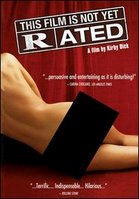
This Film Is Not Yet Rated (Kirby Dick, 2006) [6]
It's a little surprising to me that it took this long for someone to make a film about the asinine rating process that the MPAA has been using for so long. Maybe it's because so many filmmakers don't really want to bite the hand that feeds them, seeing that compliance with the ratings board will help lengthen a career. Dick as a director has no such problem biting the hand that feeds him, and he does a good job of playing the pain in the ass, his persistent phone calls with the ratings and appeals board the chief examples. The film plays out best when it's the muckraking expose piece, hiring private investigators to find out who the raters are and (surprise!) they don't exactly fit the qualifications of what the MPAA says they are. Through Dick's investigation and some talking head interviews, the film paints a perfect picture of the MPAA being a shadowy, near "fascist" (Bingham Ray's words in the film) organization that while claiming to protect filmmakers from censorship, does a pretty good job of the act itself. Jack Valenti, who I feel is a career political hack on the same level as protoplasm, comes out the villain, as he should. And it is truly troubling that very few films have the balls to go without a rating, as it's clearly stated that films don't have to be rated.
Which brings me to the question, "Why didn't Kirby Dick just release the film without a rating?" In my mind, the more effective tool to get back at the ratings board would to be say screw you, you aren't necessary. But he goes through the entire appeals process, which on a filmic level makes the film more interesting in that it reveals more identities, lacks something in the way of conviction. The other weakness here is there's not enough history of films rated NC-17 or X. A few films and their examples are thrown in but Dick doesn't even go back to films like Midnight Cowboy or A Clockwork Orange. These films were rated X and yet did solid box office, received Academy Awards, or became influential films. Dick plays the victim card too much, and the more successful fights he can bring up, the stronger argument he could have had.
Thursday, January 25, 2007
Leonard Cohen - I'm Your Man
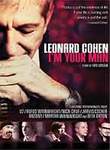
Leonard Cohen - I'm Your Man (Lian Lunson, 2006) [7]
The concert film/music documentary has become so watered down and so often used as a way to make a quick buck that it truly is refreshing to see one that has some thought and craft put into it. The basis for this film was a concert given in Australia that celebrated the songs of Leonard Cohen by artists such as Rufus and Martha Wainwright, Nick Cave, Antony, Jarvis Cocker, and Bono and Edge of U2 at a separate time. While none of the names on the concert bill may leap out at someone who's idea of good music is American Idol, it seems fitting because Cohen himself was never the type of success and had the tremendous influence as someone like Bob Dylan. Personally speaking, even though I love Dylan, I find Leonard Cohen the most impressive lyricist I've ever come into contact with. The way he mixes the sacred and the profane, the serious with a touch of humor, and how he grounds it in an all too fragile reality resonate with me more than any other artist.
Outside of my appreciation for Leonard Cohen, the film is well-done for the majority of it. The concert section is restrained and well filmed. Lunson doesn't let himself over-edit with one exception, letting the performances and Cohen's words linger in the viewer. All of the performances are solid, but I think that Antony's performance of "If It Be Your Will" is exceptional, showing the soulful, sacred nature of Cohen's songs. Lunson's interviews with Cohen are also refreshing. Cohen doesn't try to make himself out to be a great artist; most of the time, he discusses where he feels he has shortcomings in his music. They are truly interesting conversations and my only wish is that there were a little bit more of them. But it's still nice to see a film that while being referential towards its subject, doesn't fawn over it making it trivial.
Wednesday, January 24, 2007
I Don't Give a Crap About the Oscars
Academy Award nominations were announced yesterday but I don't care about them anymore. If you want to look back in the archives, you'll find that I said that if Crash won Best Picture last year, I would boycott watching and caring about them forever. I'm a man of my word, so I'll stay away from any Oscar related news. Besides, I haven't seen enough films from this year to have a real valid opinion anyway. The Academy has a long history of dubious decisions and as of late, have been rewarding tripe like A Beautiful Mind and Crash. These films fuel the cheap liberal guilt that is rampant in Hollywood and give perfect opportunity for those vapid dingbats to think they're edgy and get it. The problem is they reward films that are emotionally manipulative and don't actually have any degree of substance or political conviction to them. There's an article by Pete Keough of The Phoenix online that pretty much sums up my feelings of what gets nominated and why. You can check it out here. I haven't seen many of these films so I can't say for certain that I feel the same about every specific performance but the gist of the story is what's important. As for my specific feelings, all I've heard about Babel is that it's Crash taking place all over the world instead of just L.A., which means it will probably win Best Picture.
Monday, January 22, 2007
Coachella Lineup
Going to Coachella has never been anything that I've wanted to do. For one thing, it's all the way on the other side of the country, which means it would cost me a small fortune to go. Plus, spending a weekend in the sweltering desert surrounded by elitist hipsters doesn't sound like that great of a time. While I may be elitist when it comes to film, music is a different story. As someone who really got into the jamband scene, Coachella was and for the most part still is the complete opposite of the spectrum. But over the past few years, I've begun to listen and enjoy more diverse ("indie) groups. My biggest problem with the hardcore fans on both sides (including jamband fans) is that they outright dismiss or look down anything that they don't consider their base.
That's pretty much beside the point I meant to make. I have to say that Coachella's lineup this year is the most intriguing I've seen. It still stays pretty close to the template they've laid down but this is the first time that there's been more than a handful of bands I would have wanted to see:
That's pretty much beside the point I meant to make. I have to say that Coachella's lineup this year is the most intriguing I've seen. It still stays pretty close to the template they've laid down but this is the first time that there's been more than a handful of bands I would have wanted to see:
Rage Against the Machine (so I can remember what I listened to in high school)
The Arcade Fire
Willie Nelson
Manu Chao
The Decemberists
Sonic Youth
Kings of Leon
Travis
Grizzly Bear
Sparklehorse
The Black Keys
Damien Rice
Nickel Creek
The Avett Brothers
The New Pornographers
Regina Spektor
Explosions In the Sky
Of Montreal
Amos Lee
Fountains of Wayne
Gillian Welch
Plus a lot of others. Even though that's pretty good, tickets are too much ($250!!) and I'd still rather go to Bonnaroo. I hope some of these artists head to Tennessee too.
Friday, January 19, 2007
Listening Post - January 2007
It's the return of the Useless Film Snob Listening Post, where I force my music opinions on you as well. This time, we're scrounging a little as most of what I'm still listening to at this time was covered on my Best of 2006 list. This list is a little mix of older and newer.
Catfish Haven - Tell Me (A really nice '60s Soul inspired garage band with a singer with a great voice.)
The Hold Steady - Seperation Sunday (Boys & Girls In America was the first I heard of them, and I liked it so much, I had to go back to the earlier stuff.)
Old Crow Medicine Show - O.C.M.S. (They have a new album out, but I still go back to this one. They put on a good live show too.)
The Grateful Dead - Europe '72 (In my mind the best official live Dead album released. The more rootsy songs fit my preference more. Jerry's guitar is sublime on China Cat Sunflower>I Know You Rider.)
The Bonnaroo lineup should be coming out in a week or so and there already a couple of leaked confirmations: The Hold Steady, Cold War Kids, John Butler Trio, Fountains of Wayne, and Charlie Louvin. A supposed "lineup" was leaked that included Bob Dylan, Pearl Jam, Tom Waits, Willie Nelson, The Police, Band of Horses, Wilco, Ryan Adams, The Shins, and the Arcade Fire among others. While the validity of this is somewhat in question, if it even is somewhat correct, 2007 will blow 2006 out of the water.
Catfish Haven - Tell Me (A really nice '60s Soul inspired garage band with a singer with a great voice.)
The Hold Steady - Seperation Sunday (Boys & Girls In America was the first I heard of them, and I liked it so much, I had to go back to the earlier stuff.)
Old Crow Medicine Show - O.C.M.S. (They have a new album out, but I still go back to this one. They put on a good live show too.)
The Grateful Dead - Europe '72 (In my mind the best official live Dead album released. The more rootsy songs fit my preference more. Jerry's guitar is sublime on China Cat Sunflower>I Know You Rider.)
The Bonnaroo lineup should be coming out in a week or so and there already a couple of leaked confirmations: The Hold Steady, Cold War Kids, John Butler Trio, Fountains of Wayne, and Charlie Louvin. A supposed "lineup" was leaked that included Bob Dylan, Pearl Jam, Tom Waits, Willie Nelson, The Police, Band of Horses, Wilco, Ryan Adams, The Shins, and the Arcade Fire among others. While the validity of this is somewhat in question, if it even is somewhat correct, 2007 will blow 2006 out of the water.
Thank You For Smoking
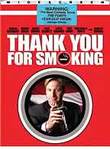
Thank You For Smoking (Jason Reitman, 2006) [6]
I really don't have much to say about this, it has its funny moments and all, but I didn't feel that it was as biting as a satire as I was led to believe. Some of that probably had to do with seeing Idiocracy right before it. Anyway, Reitman seems to take swipes at all sides, not just the tobacco industry but also the shameless nature of lobbying and it bedfellows on Capitol Hill. The film gives it to the hypocrites in government just as much as the tobacco industry. As someone who has a libertarian stance on smoking, I agree with the message that smoking is a personal decision and a conscious decision that a person makes. That's basically Nick Naylor's speech at the end, but then he goes and ruins it by making the soul-searching gesture and quits. It rings hollow to me for some reason. It doesn't fit mostly because the film is much like Nick Naylor himself, smug. Aaron Eckhart does a good job of portraying the right amount of smugness all the while creating defenses for himself and what he does. Reitman as a director plays right into this, which at times makes the film too proud of itself and "its look who I'm pissing off now" attitude. This had the possibility to really get it right if it just could keep its focus and not cop out at the end.
Monday, January 15, 2007
Idiocracy
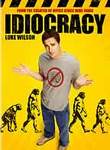
Idiocracy (Mike Judge, 2006) [6]
This film is most known for being unceremoniously dumped by 20th Century Fox into a handful theatres and not being screened for critics. That would usually mean that it's a piece of crap but it's by Mike Judge and the idea seems brilliant: a man frozen for 300 years wakes up and finds a crass, stupid culture that has made him the smartest man in the world. The result is a bit of a mixed bag but with enough biting, funny satire to make me feel that this film didn't deserve the fate it received.
Luke Wilson is great as an average guy (naturally his name is Joe) that takes part in an experiment that causes him to wake up in a future where crass commercialism has take over everything, people speak in a redneck/ebonics/profanity laced slang, and any form of intelligence gets a person labeled as a "fag." The satire Judge lays down here is clever and often hilarious. The future is a world where Starbucks offers handjobs, the Secretary of State is a pitchman for Carls, Jr., and the President is a former Ultimate Fighting Champion. It's a world where stupidity is celebrated and preferred, evidenced by two of the best scenes in the film, an exchange where the Luke Wilson character is trying to explain that water is best for growing crops but can't get the idea across because the others only can think in stupid catchphrases. The scenes with the Wilson character on trial as well as the Ow, My Balls! scenes are hilarious, mostly because they're not that far removed from the world we live in now.
My main problem with the film deals with the tone. Even though this is a satire, it just seems too mean-spirited at times. In dealing with his material, Judge finds a middle ground that can offend everybody just a little bit. Most troubling is the portrayal of the people of the future, whose language seems as veiled racism (both black and white) making fun of ebonics as well as redneck slang. The film works when it takes on commercialism and the corporate culture that is overtaking America, but when Judge lays into society as a whole, he may go t
Saturday, January 13, 2007
Little Miss Sunshine

Little Miss Sunshine (Jonathan Dayton & Valerie Faris, 2006) [5]
Maybe I'm missing something but I can't find anything that explains all the hype this film has been getting. Sure, it leaves you with a nice feel-good ending and it has all the eccentric characters that can be found in any Sundance favorite. The problem for me is that there's nothing here that is really refreshing to me; the characters feel like their traits are too forced upon. They're wacky just for the sake of being wacky, something I never particularly care for. The only saving grace is Abigail Breslin as Olive, the one character in this film that has some real grounding and brings the best out of the film, mostly this nation's preoccupation with winners. Her performance is the most real and impressive in the film, even though the Greg Kinnear character is also good as the loser father obsessed with winners. But a grandfather that starts snorting heroin just because he's old? Come on. The ending does redeem the film somewhat as the shameless nature of the Little Miss Sunshine pageant is exposed to the family and the audience. We come to realize that winning isn't everything and that the Hoovers have grown as a family through all the torture they've had to endure in trying to be winners. I guess that makes you feel good but I don't know if that's what I really want out of the ending. For an ending that is somewhat rewarding, it didn't feel that deserving seeing how unimpressive I felt the everything up to that point had been.
Thursday, January 11, 2007
United 93
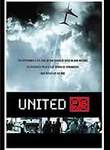
United 93 (Paul Greengrass, 2006) [8]
This is one of the toughest films that I've written a review for mostly because I'm attempting to separate the emotional impact that the film delivers, which is undoubtedly the strongest I can remember in sometime, and where this stands as a film. There is no doubt that this film has an emotional impact; for me, it was the feeling of complete helplessness as you know where the film is going and what the final outcome will be. Yet as the film unfolds and the people on that flight are shown, the anxiety within me grows as I know what is coming. That's the extraordinary power this film has, especially for the first hour or so leading to the hijacking of the flight, when you know what's going to happen and are helpless to either stop it or just get it over with.
The director of United 93 is Paul Greengrass, who made Bloody Sunday, an amazing film about the violent 1972 clash between Irish Catholic demonstrators and Protestant, British police in Northern Ireland. The docudrama style of that film fits perfectly here, as it allows to capture everything just as it happens, not allowing point of view to come into play, which would have crippled the film. Greengrass does a great job of creating a taut, streamlined film that conveys the frantic action on the flight as well as the bewilderment and near incompetence of the people on the ground trying to figure out what to do and what's going on. The first half of the film is immensely effective, creating a powerful amount of nail-biting tension that is released as the hijackers take over the flight. From then on, Greengrass does a good job of keeping the film focused and not becoming emotionally manipulative. He does a good job of keeping the hijackers human and not some kind of action movie villain cliches. And all in all, the film becomes a memorial to those who did what they did on that flight without turning the events into a jingoistic rallying cry. But as a film, it seems too preoccupied in being a memorial, evidenced in the title cards at the end. The actions of those onboard were no doubt heroic but the film differentiates between those who acted and the ones that did nothing. We can never be sure what happened down to exact details, what actually happened and what we want to believe happened. Even though, this is still an impactful film.
Wednesday, January 10, 2007
McCabe & Mrs. Miller
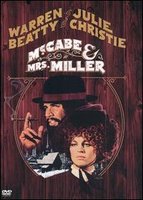
McCabe & Mrs. Miller (Robert Altman, 1971) [10]
Ever since Robert Altman's death, I've been going over his body of work and have come to the conclusion that he is quite possibly my favorite director. This is the third Altman film I have given a perfect score to, along with The Long Goodbye and Short Cuts. A lot of reviews state this film is an anti-western, a perfect example of the genre deconstructionist that Altman was. That's not quite true; the film isn't a western in the typical Hollywood style but the characters, McCabe, a gambler who thinks he's smarter than he is played by Warren Beatty, and the humanistic prostitute played by Julie Christie are archetypical western characters. It's how Altman portrays them on the screen that raises them above standard characterization. There is an underlying melancholy in the characters, not just in their actions and mannerisms but in the film as a whole. The setting is consistently dreary, cloudy, and always raining and snowing. You can just get the feeling that the only result for McCabe and Mrs. Miller is failure. They, like the town, are doomed from the start.
This all leads back to the most prominent aspects of the film, the look and sound of it. Almost every review mentions the muddy overlapping sound, an Altman trademark, as well as the look of the film, most of which was accomplished by flashing the negative before filming. This is where the film truly lies for me. The look and sound of the film is key for the overall theme of the film. When I think of this film, I think of muddiness, not just the aesthetics, but also the town of Presbyterian Church as well as the characters themselves. The opening scene where McCabe first comes into town is as close to a perfect sequence as I could imagine. But its also the jumping point for many. The scene is so dark and the soundtrack so muddled that if you don't get it, it's better to just turn off this film and forget about it. Altman lays it all out early; this isn't going to be some pristine John Ford western, in look or theme. It's the complete difference in form that makes McCabe & Mrs. Miller so difficult yet so rewarding to those who understand what Altman wants out of it.
Also, the use of the Leonard Cohen songs in the film are absolutely phenomenal, especially the scenes when the prostitutes first arrive and 'Sisters of Mercy' is playing. Brilliant.
Friday, January 05, 2007
Useless Film Snob Book Report - Rebels on the Backlot
Rebels On the Backlot: Six Maverick Directors and How They Conquered the Hollywood Studio System - Sharon Waxman, 2005
In an effort to diversify this site and make it a little better, we're starting a new feature called Useless Film Snob Book Reports, where I'll try to give my opinions on what I've been reading as inarticulately as possible. First up is New York Times Hollywood reporter (not a great first description) Sharon Waxman's account of how Spike Jonze, Paul Thomas Anderson, Quentin Tarantino, David O. Russell, David Fincher, and Steven Soderbergh invaded the studio system and against all odds, somehow managed to make credible, artistic movies in the vacuous, money-grubbing world that are the major studios. At least that's what Waxman wants you to believe. Actually, it's a little more nuanced than that. Let's be honest here; these filmmakers aren't exactly breaking the mold that much. While these films they made may be good, some great, some had major stars in them, made a sizable profit, or were prestige pictures made for awards. There is some truth that these weren't exactly "safe" pictures but the glaring failure of Waxman's book is she is trying to equate these directors and their work in the studio system to what was going on in the late 60's and 70's. What the current directors lack is the cultural significance and widespread appeal that people like Coppola, Friedkin, Altman, Scorsese, and others had in the 70's. So problem number one is Waxman overreaches here a bit. Pulp Fiction may have been a zeitgeist film, but the others covered in the book didn't become cultural benchmarks.
Another problem Waxman has is that she clearly read Peter Biskind's two fantastic books, Easy Riders, Raging Bulls about the 70's period and his Sundance/Miramax book, Down and Dirty Pictures, and cribs heavily from them, especially the latter. She lifts entire sections dealing with Tarantino from Biskind's book and plops right into her story. While Biskind's book had its fair share of gossip and innuendo, everything is told in such a fair and entertaining matter. Waxman seems to have a pre-occupation with showing every director's personality flaws that she practically forgets about the films themselves, which is especially the case with Anderson and Tarantino. This makes Waxman seem more like the shallow Hollywood reporter more concerned with gossip and celebrities' personal lives than a true author really getting into the art of filmmaking, which Biskind does a lot better.
All this leads to the more glaring weakness of the book, the number of factual errors in the book, which are astounding seeing this was published through a major company. All the examples have been discussed other places but two of the ones I can't get out of my mind is that she states that Rushmore was Wes Anderson's first film and that Julia Stiles played Michael Douglas's daughter in Traffic. It seems Waxman and her editor(s) haven't actually seen the films of the directors she's writing about, which would explain the lack of any credible analysis of the work besides Fight Club is violent and Magnolia is long. A book with glaring errors like this makes it hard for me to take it as a serious work by an author who knows what she's talking about. I bought this book because I happen to like the films that these directors made and wanted to know more about the process of how they got made. But Waxman does such a slipshod job of making her argument in the book that I came away thoroughly disappointed.
In an effort to diversify this site and make it a little better, we're starting a new feature called Useless Film Snob Book Reports, where I'll try to give my opinions on what I've been reading as inarticulately as possible. First up is New York Times Hollywood reporter (not a great first description) Sharon Waxman's account of how Spike Jonze, Paul Thomas Anderson, Quentin Tarantino, David O. Russell, David Fincher, and Steven Soderbergh invaded the studio system and against all odds, somehow managed to make credible, artistic movies in the vacuous, money-grubbing world that are the major studios. At least that's what Waxman wants you to believe. Actually, it's a little more nuanced than that. Let's be honest here; these filmmakers aren't exactly breaking the mold that much. While these films they made may be good, some great, some had major stars in them, made a sizable profit, or were prestige pictures made for awards. There is some truth that these weren't exactly "safe" pictures but the glaring failure of Waxman's book is she is trying to equate these directors and their work in the studio system to what was going on in the late 60's and 70's. What the current directors lack is the cultural significance and widespread appeal that people like Coppola, Friedkin, Altman, Scorsese, and others had in the 70's. So problem number one is Waxman overreaches here a bit. Pulp Fiction may have been a zeitgeist film, but the others covered in the book didn't become cultural benchmarks.
Another problem Waxman has is that she clearly read Peter Biskind's two fantastic books, Easy Riders, Raging Bulls about the 70's period and his Sundance/Miramax book, Down and Dirty Pictures, and cribs heavily from them, especially the latter. She lifts entire sections dealing with Tarantino from Biskind's book and plops right into her story. While Biskind's book had its fair share of gossip and innuendo, everything is told in such a fair and entertaining matter. Waxman seems to have a pre-occupation with showing every director's personality flaws that she practically forgets about the films themselves, which is especially the case with Anderson and Tarantino. This makes Waxman seem more like the shallow Hollywood reporter more concerned with gossip and celebrities' personal lives than a true author really getting into the art of filmmaking, which Biskind does a lot better.
All this leads to the more glaring weakness of the book, the number of factual errors in the book, which are astounding seeing this was published through a major company. All the examples have been discussed other places but two of the ones I can't get out of my mind is that she states that Rushmore was Wes Anderson's first film and that Julia Stiles played Michael Douglas's daughter in Traffic. It seems Waxman and her editor(s) haven't actually seen the films of the directors she's writing about, which would explain the lack of any credible analysis of the work besides Fight Club is violent and Magnolia is long. A book with glaring errors like this makes it hard for me to take it as a serious work by an author who knows what she's talking about. I bought this book because I happen to like the films that these directors made and wanted to know more about the process of how they got made. But Waxman does such a slipshod job of making her argument in the book that I came away thoroughly disappointed.
Saturday, December 23, 2006
Useless Film Snob Recommended Holiday Viewing
Christmas gets more films and television specials made about it than all the other holidays put together. While I have no problem with Christmas movies, it seems that for every It's a Wonderful Life that gets released, there's a pile of dog crap like Ernest Saves Christmas or whatever to go with it. So I'm here to help you with some of my favorite Christmas stories.
Television
As a child of the 80's, I'm going to have get all nostalgic and go back to that decade. The 80's had its share of dreck (there was full length Yogi Bear Christmas movie that I found on VHS a year of two ago; there's no way this would be on television today). Besides the old Rankin-Bass standby, there were a pair of specials that are mostly forgotten today mostly because they're out of print and rarely shown:
A Muppet Family Christmas
This was shown on ABC in '87 I believe, at least that's the year we recorded on VHS. This must have been a wet dream for my six year old self seeing that it was the first time that all Jim Henson creations, Muppets, Sesame Street, and Fraggle Rock, were on the same show. It's a surprisingly funny show, even watching it now. The jokes appeal just as much to adults as little kids. I'm so attached to this show mostly because the now almost 20 year old tape I have of it is all that it remains, seeing that the DVD of it is out of print and often get $100 or more for ones on Ebay. Plus, the commercial version released has many songs cut out because Henson productions was too cheap to get clearance for everything. All in all, A Muppet Family Christmas is a forgotten gem that still is my favorite Christmas show of all time.
A Claymation Christmas
This is also on that revered VHS and another special that was released in '87. This was most notable at the time as being a tie-in with the California Raisins, whose commercials were somehow a cultural phenomenon. The show is various Christmas carols done in vignettes with various characters. It's nothing great but its nostalgic value makes it rate very highly, also because it can't be found on DVD or VHS. (Side note: South Park did something like this a couple of year ago, Mr. Hankey Christmas Classics. That episode still is one of my favorite South Parks of all time.)
Film
There are the obvious choices here, especially A Christmas Story, which ranks highly but TBS's overkill has left my wanting to see something else. So, once again we go back to the 80's to pluck out a forgotten and overlooked film:
Scrooged (Richard Donner, 1988)
In the last couple of years, this has become my favorite Christmas film. It's an updated take on A Christmas Carol with Bill Murray playing a Scroogesque television exec. If you know the Dickens story, then nothing of the basic plot is a surprise. What does work so well in the film is the biting satire of television, which in itself is a reflection on the decade. The film was partly written by Michael O'Donohouge, who was one of the original writers on SNL and was as probably as influential as shaping that show as any of the actors. The entire beginning, which is a big send up of bloated TV events, had to come from him. Bill Murray does a great job handling a familiar character but giving him enough humor and humanism to breathe new life into said character as well as the story. This film used to get shown on cable once and a while around this time of year, but less and less has been seen of it lately. It is dated, but that doesn't mean that it's not a entertaining film anymore. I happen to think it's one of the more refreshing holiday films released at least in my life of watching films. It sure beats the rampant idiocy of something like Deck the Halls. (Side note: and while I haven't seen Deck the Halls, if the trailer is any indication, it would be a complete waste of money.)
Television
As a child of the 80's, I'm going to have get all nostalgic and go back to that decade. The 80's had its share of dreck (there was full length Yogi Bear Christmas movie that I found on VHS a year of two ago; there's no way this would be on television today). Besides the old Rankin-Bass standby, there were a pair of specials that are mostly forgotten today mostly because they're out of print and rarely shown:
A Muppet Family Christmas
This was shown on ABC in '87 I believe, at least that's the year we recorded on VHS. This must have been a wet dream for my six year old self seeing that it was the first time that all Jim Henson creations, Muppets, Sesame Street, and Fraggle Rock, were on the same show. It's a surprisingly funny show, even watching it now. The jokes appeal just as much to adults as little kids. I'm so attached to this show mostly because the now almost 20 year old tape I have of it is all that it remains, seeing that the DVD of it is out of print and often get $100 or more for ones on Ebay. Plus, the commercial version released has many songs cut out because Henson productions was too cheap to get clearance for everything. All in all, A Muppet Family Christmas is a forgotten gem that still is my favorite Christmas show of all time.
A Claymation Christmas
This is also on that revered VHS and another special that was released in '87. This was most notable at the time as being a tie-in with the California Raisins, whose commercials were somehow a cultural phenomenon. The show is various Christmas carols done in vignettes with various characters. It's nothing great but its nostalgic value makes it rate very highly, also because it can't be found on DVD or VHS. (Side note: South Park did something like this a couple of year ago, Mr. Hankey Christmas Classics. That episode still is one of my favorite South Parks of all time.)
Film
There are the obvious choices here, especially A Christmas Story, which ranks highly but TBS's overkill has left my wanting to see something else. So, once again we go back to the 80's to pluck out a forgotten and overlooked film:
Scrooged (Richard Donner, 1988)
In the last couple of years, this has become my favorite Christmas film. It's an updated take on A Christmas Carol with Bill Murray playing a Scroogesque television exec. If you know the Dickens story, then nothing of the basic plot is a surprise. What does work so well in the film is the biting satire of television, which in itself is a reflection on the decade. The film was partly written by Michael O'Donohouge, who was one of the original writers on SNL and was as probably as influential as shaping that show as any of the actors. The entire beginning, which is a big send up of bloated TV events, had to come from him. Bill Murray does a great job handling a familiar character but giving him enough humor and humanism to breathe new life into said character as well as the story. This film used to get shown on cable once and a while around this time of year, but less and less has been seen of it lately. It is dated, but that doesn't mean that it's not a entertaining film anymore. I happen to think it's one of the more refreshing holiday films released at least in my life of watching films. It sure beats the rampant idiocy of something like Deck the Halls. (Side note: and while I haven't seen Deck the Halls, if the trailer is any indication, it would be a complete waste of money.)
Tuesday, December 19, 2006
I Hope I Don't Think I'm Important Now
This site has been around since January, and in the past year I've had around 120 page views or whatever qualifying feature sitemeter uses to track people visiting this blog. I'm certain that out of those 120, a good percentage were myself (I'll say around 35 to 40%). I've never created this site wishing to have a lot of visitors; it was mostly a way to stoke my ego because who doesn't want to read a half-assed review of Casino ten years after it was released? The lack of anyone else finding the site never really bothered me. I kind of accepted that The Useless Film Snob wasn't that great either.
All of this lead to the decision to just remove the site until I had a realization that since every other blog out there was posting a year-end list of the best albums, I might as well feed my ego and join in. So the Useless Film Snob got reinvented as a music site for a few days. Then, something weird happened. Since I posted the first part of my list on Sunday, I've gotten half as many visits in the last two days as I've gotten since I started the site in January. I found out the reason was that my list got posted on Largehearted Boy's index of best 0f lists, which I never expected to happen. I guess it's flattering to be on the same list with credible publications and well-known blogs. But I just made the list to for myself; and never really thought it would be taken seriously, or even seen, by hardly anyone else. I'm not trying to be an influential music blogger; there are too many of those already. What I'm trying to say is that I don't think I have any credible opinions to offer about music. I just like music a lot and happen to post about it from time to time. I do appreicated Largehearted Boy for adding me to his list. They do a great job of posting Bonnaroo and Vegoose sets to download. They are a credible music blog. And while I do appreciate that it has brought more visitors, I hope it doesn't mean this site will actually be taken seriously now.
All of this lead to the decision to just remove the site until I had a realization that since every other blog out there was posting a year-end list of the best albums, I might as well feed my ego and join in. So the Useless Film Snob got reinvented as a music site for a few days. Then, something weird happened. Since I posted the first part of my list on Sunday, I've gotten half as many visits in the last two days as I've gotten since I started the site in January. I found out the reason was that my list got posted on Largehearted Boy's index of best 0f lists, which I never expected to happen. I guess it's flattering to be on the same list with credible publications and well-known blogs. But I just made the list to for myself; and never really thought it would be taken seriously, or even seen, by hardly anyone else. I'm not trying to be an influential music blogger; there are too many of those already. What I'm trying to say is that I don't think I have any credible opinions to offer about music. I just like music a lot and happen to post about it from time to time. I do appreicated Largehearted Boy for adding me to his list. They do a great job of posting Bonnaroo and Vegoose sets to download. They are a credible music blog. And while I do appreciate that it has brought more visitors, I hope it doesn't mean this site will actually be taken seriously now.
Sunday, December 17, 2006
The Best Music of 2006 - Part Two
Now comes the time to reveal my top ten albums of the year. Before I start, I just want to say that 2006 was the first year that I really started to listen to lots and lots of different albums. It used to be that I liked what I liked and that was it. I was really into the whole jamband scene, but since much of it has fallen into boring repetition, I've gone elsewhere to find other stuff, and I've been pleasantly surprised at the wide range of albums that have made up this list.
Here's a category that I forgot to put on Part One of the list:
Best Music Related Website
An Aquarium Drunkard
Stereogum may be more entertaining at times, but nobody brings out the good stuff like this site. Besides the excellent podcasts, this site brings out rare stuff like The Black Crowes' "Lost Crowes" Material. Any site that posts about Califone, The Louvin Brothers, and the Bowie/Bing Crosby "Little Drummer Boy" track is worth a look. Plus, his Best of 2006 list is pretty much right on.
The Best Albums 0f 2006
10) Blood Meridian - Kick Up the Dust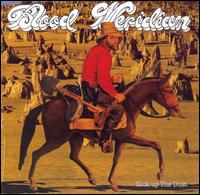
Another Canadian group but their name and sound makes it sound like they come out of the American West. I consider this country-tinged rock with a hint of weirdness, music that recalls the violent and drunk West that been mythologized in literature and song. The album is a fantastic group of songs about simple themes (jobs, relationships, death) but done in such a captivating, haunting way.
Choice cuts: "Most Days", "Kick Up the Dust"
9) The Black Keys - Magic Potion
One of the appealing aspects of The Black Keys, but it also may be seen as a fault, is that you're pretty certain what you're going to get: straight-ahead blues rock. While Magic Potion may not stray that far from the sound of their previous albums, I think it's a better album than Rubber Factory, their previous effort. The sound here sounds fat, large, and almost impossible to be coming from two people. They may not be re-inventing the wheel, but if you're a sucker for classic guitar riffs and bluesy vocals, this album will appeal to you.
Choice cuts: "Your Touch", "Modern Times"
8) Bob Dylan - Modern Times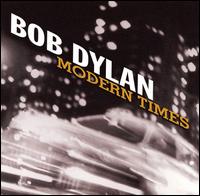
This is a natural progression for Dylan after Time Out of Mind and Love and Theft but it just doesn't seem to have the refreshing rejuvination of the first or the sublime nature of the latter. It almost sounds like these songs were outtakes from the Love and Theft sessions, they're that similar in their themes and musical qualities. Still, from Dylan, an album that almost sounds tossed off at times is infinitely better than what most other artists have released in the current year.
Choice cuts: "Thunder On the Mountain", "Rollin' and Tumblin'
7) Cat Power - The Greatest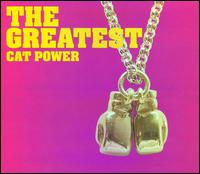
A lot has been made of Chan Marshall's sobriety and newfound strength as a live performer, and I think some of the credit has to go to the fact she has quality backing musicians instead of just being a solo act. This album could be called Chan in Memphis, seeing that it has so many comparisons with Dusty Springfield, all the way down to the backing musicians. She sounds confident on the album, and her voice fits perfectly with subtle touches of the Memphis Rhythm Band that's been backing her.
Choice cuts: "The Greatest", "Lived In Bars"
6) Jenny Lewis with the Watson Twins - Rabbit Fur Coat
Jenny Lewis steps out of Rilo Kiley and makes an album that embraces country and southern soul without a hint of irony. Everything on this album is sublime, starting from the vocal harmonies on the opening track. The vocals clearly stand out but Lewis's lyrics, straight ahead and vaguely spiritual, are just as strong. The Watson Twins' harmonies add a touch of country gospel that really makes the album. I've read some reviews that this album is kind of a campy schtick, but I feel that Jenny Lewis honestly cares about this music and the country influences in it.
Choice cuts: "Rise Up With Fists!!", "Happy"
5) The Hold Steady - Boys & Girls In America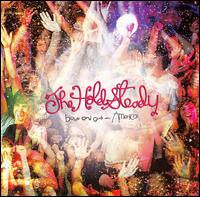
What's surprising to me about the Hold Steady's popularity and positive reviews in hipster circles is that they are making a straight-forward rock record and doing so without any irony. They're really just a bar band with songs that deal mostly with getting loaded and hookin up, none of which I think would appeal to that group. Part Springsteen, throw in a little twin guitar attack of Thin Lizzy, and some english major lyrics by Craig Finn, and you have a great rock & roll album.
Choice cuts: "Hot Soft Light", "Southtown Girls"
4) Solomon Burke - Nashville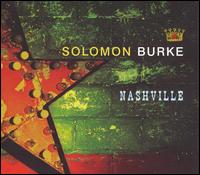
Just hearing it, it doesn't sound like that great of an idea; the King of Rock & Soul doing an album of country covers. All it takes, however, is the first couple seconds of the opening track, "That's How I Got to Memphis" to change my mind. Burke understands that country music is just southern white should music, and the songs on this album have just as much passion and emotion of any of his soul classics. His voice may not be as spectacular as it used to be, but Burke's greatest quality on this album is the way he can make it adapt to each song presented. He can do the up-tempo numbers, and he can do the weepies. And the greatest compliment I can give is that Solomon Burke makes me feel what he's singing.
Choice cuts: "Valley of Tears", "Millionaire"
3) Band of Horses - Everything All The Time
When you want to describe Band of Horses to someone, you end up saying that they sound like The Shins mixed with My Morning Jacket. That's pretty much right on target; the songs here exist somewhere between the Americana guitar rock of MMJ and the power pop of The Shins. Ben Bridwell and company create shimmering songs that range from country influenced acoustic numbers to raw, guitar driven ones. Everything All the Time is a short (perhaps too short), concise album that I have repeatedly listened to over the past year.
Choice cuts: "The Funeral", "The Great Salt Lake"
2) Josh Ritter - The Animal Years
This album has been on or near the top of my best of list since I first got it. Up until recently, this was the album I had listened to the most over the past year, just being overtaken by the number one choice. The album is the standard singer/songwriter album, and while Ritter does nothing drastically different, the songcraft is done so well that innovation isn't something to be regarded. The melodies are superb, especially in the first three tracks. "Thin Blue Flame" is my choice for song of the year, with its vivid lyrical imagery and it quiet/loud crescendo. On a somewhat related note, in Stephen King's column in Entertainment Weekly, he declared this his number one album of 2006. Last year, he named Marah's If You Didn't Laugh, You'd Cry as his top choice. That album was my number two album last year, and Josh Ritter is number two this year. Strange.
Choice cuts: "Wolves", "Thin Blue Flame"
1) Howlin' Rain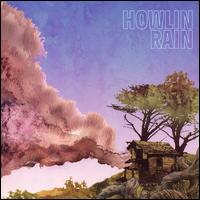
Imagine a little more menacing Grateful Dead, throw in some Exile-era Stones, and you kind of have the sound of Howlin' Rain, a side project for Ethan Miller of Comets on Fire. The songs sound like the soundtrack to drinking beer in a isolated cabin on a dusty country road. The songs are more melodic than the Comets but they still feature psychedelic guitar chaos and the whiskey scarred vocals of Miller. The songs are shambling and border on the edge of disinegration, and maybe that's what appeals to me so much. Howlin' Rain isn't polished music; it's rough and imperfect, and yet it's still completely likeable. This album has that something that makes me want to listen to it over and over again. And for that, it's my choice for best album of 2006.
Choice cuts: They're all good but especially "Roll On The Rusted Days" and "The Firing Of The Midnight Rain"
Here's a category that I forgot to put on Part One of the list:
Best Music Related Website
An Aquarium Drunkard
Stereogum may be more entertaining at times, but nobody brings out the good stuff like this site. Besides the excellent podcasts, this site brings out rare stuff like The Black Crowes' "Lost Crowes" Material. Any site that posts about Califone, The Louvin Brothers, and the Bowie/Bing Crosby "Little Drummer Boy" track is worth a look. Plus, his Best of 2006 list is pretty much right on.
The Best Albums 0f 2006
10) Blood Meridian - Kick Up the Dust

Another Canadian group but their name and sound makes it sound like they come out of the American West. I consider this country-tinged rock with a hint of weirdness, music that recalls the violent and drunk West that been mythologized in literature and song. The album is a fantastic group of songs about simple themes (jobs, relationships, death) but done in such a captivating, haunting way.
Choice cuts: "Most Days", "Kick Up the Dust"
9) The Black Keys - Magic Potion

One of the appealing aspects of The Black Keys, but it also may be seen as a fault, is that you're pretty certain what you're going to get: straight-ahead blues rock. While Magic Potion may not stray that far from the sound of their previous albums, I think it's a better album than Rubber Factory, their previous effort. The sound here sounds fat, large, and almost impossible to be coming from two people. They may not be re-inventing the wheel, but if you're a sucker for classic guitar riffs and bluesy vocals, this album will appeal to you.
Choice cuts: "Your Touch", "Modern Times"
8) Bob Dylan - Modern Times

This is a natural progression for Dylan after Time Out of Mind and Love and Theft but it just doesn't seem to have the refreshing rejuvination of the first or the sublime nature of the latter. It almost sounds like these songs were outtakes from the Love and Theft sessions, they're that similar in their themes and musical qualities. Still, from Dylan, an album that almost sounds tossed off at times is infinitely better than what most other artists have released in the current year.
Choice cuts: "Thunder On the Mountain", "Rollin' and Tumblin'
7) Cat Power - The Greatest

A lot has been made of Chan Marshall's sobriety and newfound strength as a live performer, and I think some of the credit has to go to the fact she has quality backing musicians instead of just being a solo act. This album could be called Chan in Memphis, seeing that it has so many comparisons with Dusty Springfield, all the way down to the backing musicians. She sounds confident on the album, and her voice fits perfectly with subtle touches of the Memphis Rhythm Band that's been backing her.
Choice cuts: "The Greatest", "Lived In Bars"
6) Jenny Lewis with the Watson Twins - Rabbit Fur Coat

Jenny Lewis steps out of Rilo Kiley and makes an album that embraces country and southern soul without a hint of irony. Everything on this album is sublime, starting from the vocal harmonies on the opening track. The vocals clearly stand out but Lewis's lyrics, straight ahead and vaguely spiritual, are just as strong. The Watson Twins' harmonies add a touch of country gospel that really makes the album. I've read some reviews that this album is kind of a campy schtick, but I feel that Jenny Lewis honestly cares about this music and the country influences in it.
Choice cuts: "Rise Up With Fists!!", "Happy"
5) The Hold Steady - Boys & Girls In America

What's surprising to me about the Hold Steady's popularity and positive reviews in hipster circles is that they are making a straight-forward rock record and doing so without any irony. They're really just a bar band with songs that deal mostly with getting loaded and hookin up, none of which I think would appeal to that group. Part Springsteen, throw in a little twin guitar attack of Thin Lizzy, and some english major lyrics by Craig Finn, and you have a great rock & roll album.
Choice cuts: "Hot Soft Light", "Southtown Girls"
4) Solomon Burke - Nashville

Just hearing it, it doesn't sound like that great of an idea; the King of Rock & Soul doing an album of country covers. All it takes, however, is the first couple seconds of the opening track, "That's How I Got to Memphis" to change my mind. Burke understands that country music is just southern white should music, and the songs on this album have just as much passion and emotion of any of his soul classics. His voice may not be as spectacular as it used to be, but Burke's greatest quality on this album is the way he can make it adapt to each song presented. He can do the up-tempo numbers, and he can do the weepies. And the greatest compliment I can give is that Solomon Burke makes me feel what he's singing.
Choice cuts: "Valley of Tears", "Millionaire"
3) Band of Horses - Everything All The Time

When you want to describe Band of Horses to someone, you end up saying that they sound like The Shins mixed with My Morning Jacket. That's pretty much right on target; the songs here exist somewhere between the Americana guitar rock of MMJ and the power pop of The Shins. Ben Bridwell and company create shimmering songs that range from country influenced acoustic numbers to raw, guitar driven ones. Everything All the Time is a short (perhaps too short), concise album that I have repeatedly listened to over the past year.
Choice cuts: "The Funeral", "The Great Salt Lake"
2) Josh Ritter - The Animal Years

This album has been on or near the top of my best of list since I first got it. Up until recently, this was the album I had listened to the most over the past year, just being overtaken by the number one choice. The album is the standard singer/songwriter album, and while Ritter does nothing drastically different, the songcraft is done so well that innovation isn't something to be regarded. The melodies are superb, especially in the first three tracks. "Thin Blue Flame" is my choice for song of the year, with its vivid lyrical imagery and it quiet/loud crescendo. On a somewhat related note, in Stephen King's column in Entertainment Weekly, he declared this his number one album of 2006. Last year, he named Marah's If You Didn't Laugh, You'd Cry as his top choice. That album was my number two album last year, and Josh Ritter is number two this year. Strange.
Choice cuts: "Wolves", "Thin Blue Flame"
1) Howlin' Rain

Imagine a little more menacing Grateful Dead, throw in some Exile-era Stones, and you kind of have the sound of Howlin' Rain, a side project for Ethan Miller of Comets on Fire. The songs sound like the soundtrack to drinking beer in a isolated cabin on a dusty country road. The songs are more melodic than the Comets but they still feature psychedelic guitar chaos and the whiskey scarred vocals of Miller. The songs are shambling and border on the edge of disinegration, and maybe that's what appeals to me so much. Howlin' Rain isn't polished music; it's rough and imperfect, and yet it's still completely likeable. This album has that something that makes me want to listen to it over and over again. And for that, it's my choice for best album of 2006.
Choice cuts: They're all good but especially "Roll On The Rusted Days" and "The Firing Of The Midnight Rain"
Saturday, December 16, 2006
The Best Music of 2006 - Part One
It seems that no matter what I say about ending this site I always manage to continue it for some particular reason. Because I refuse to go the multiplex and Binghamton has no independent theatres, it's impossible for me to go into a best films of 2006 yet because I haven't seen enough of the candidates yet. But what I can do is post my best of 2006 in terms of music. My top ten will be posted later on, but here are the honorable mention candidates as well as some miscellaneous awards.
Best of 2006 Honorable Mention
The Be Good Tanyas - Hello Love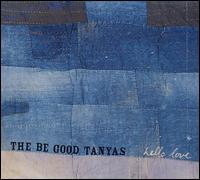
The first of a surprising number of Canadian acts on the list. A subtle blend of country, folk, bluegrass gospel and sublime vocal harmonies that make a quiet yet effective album.
Choice cuts: "A Thousand Tiny Pieces", "What Are They Doing In Heaven Today"
Sarah Harmer - I'm a Mountain
Harmer leaves AAC territory behind and heads towards a more rootsy approach. The bluegrass instrumentation and arrangements fit her vocal style just fine.
Choice cuts: "I'm a Mountain", "Will He Be Waiting For Me?"
Gomez - How We Operate
A little too polished at times but I think it's still a much better album than some reviews have said. Having seen them live twice in the past year, this material does have more vitality live, which is its greatest plus.
Choice cuts: "Hamoa Beach", "All Too Much"
Derek Trucks Band - Songlines
Bands that get labeled as "jambands" get stereotyped as being incapable of making solid studio albums. Trucks & co. are much more than a simple jamband and they prove it here, a enjoyable blend of blues, R&B, and traditional Pakistani music. And Derek Trucks may be the best slide guitar player on the planet.
Choice cuts: "Sahib Teri Bandi - Maki Madni", "Crow Jane"
Comets on Fire - Avatar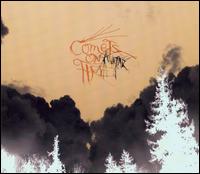
Proto-metal guitar fireworks, screeching vocals, lots of noise; it's the exact opposite of anything else on the list so far. Even though its noisy, the band can still get a serious groove going on "Sour Smoke." Still not the best Ethan Miller related project of the year however (more on that later).
Choice cuts: "Dogwood Rust", "Sour Smoke"
Built to Spill - You In Reverse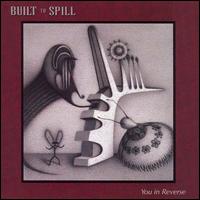
Overall, it may not be the best Built to Spill album, but it has its moments that made the wait worth it. "Conventional Wisdom" easily gets the award for guitar riff of the year.
Choice cuts: "Conventional Wisdom, "Liar"
Drive-By Truckers - A Blessing & A Curse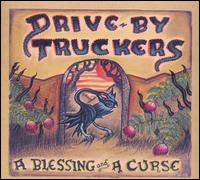
I don't think this comes anywhere close to the previous three albums, mostly because of the lack of stronger material from Mike Cooley and Jason Isbell. But the Truckers have proved they are more than just a "Southern Band."
Choice cuts: "Gravity's Gone", "Goodbye"
Neko Case - Fox Confessor Brings the Flood
The thing with Neko Case is that her exceptional voice always overshadows her songcraft. This albums has her strongest songs to day but it's still her voice that carries the album. The Sadies have added a distinctive foundation her sound that suits here just fine.
Choice cuts: "Margaret vs. Pauline", "Star Witness"
Califone - Roots & Crowns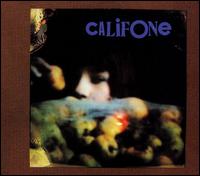
One of the best discoveries I made this year was the genre that has been labeled 'alt-folk' or 'freak folk'. Califone seems to get lumped into this category but their music seems to go beyond that ridiculous category. These songs take a while to get into, but one you do, they continue to grow.
Choice cuts: "Spider's House", "The Orchids"
Brightblack Morning Light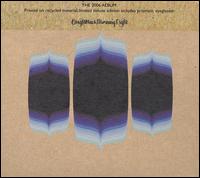
Another 'freak folk' group that is re-inventing the neo-hippie aesthetic. No longer are hippies associated with jam bands; they can also create atmospheric, trippy music made for listening to in a cabin in the woods with a good amount of a certain weed. Also, this album has the best use of a Fender Rhodes I've heard in a long time.
Choice cuts: "A River Could Be Loved", "Come Another Rain Down"
Secret Machines - Ten Silver Drops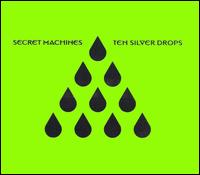
The Machines' second albums finds them greatly improving their songcraft as from start to finish, I think this is a stronger, more compact album of songs than their debut. While some may like the more spacey approach, I feel more concise songs greatly improve them.
Choice cuts: "Lightning Blue Eyes", "1000 Seconds"
Cold War Kids - Robbers & Cowards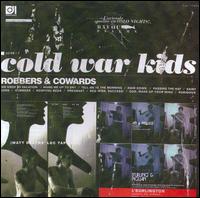
One of those blog buzz bands that I happen to like quite a bit. Their appeal lies in intriguing vocals and disjointed melodies that sound new and yet have something old and familiar about them.
Choice cuts: "Hang Me Up to Dry", "Red Wine Success"
Lucero - Rebels, Rogues & Sworn Brothers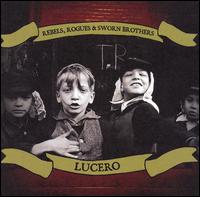
If your looking for plain and simple Alt-Country album, you're not going to find anything closer than Lucero. While their sound doesn't stray too far from the Uncle Tupelo template, this album finds them adding piano and accordion prominently to their sound. Not as good as Nobody's Darlings, but their willingness to expand their sound gets them credit.
Choice cuts: "San Francisco", "I Can Get Us Out of Here Tonight"
Biggest Disappointment of 2006
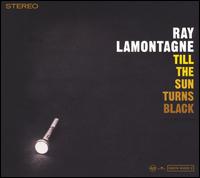
Ray LaMontagne - Until the Sun Turns Black / Damien Rice - 9
These albums aren't disappointments in that I think they are bad albums; they both have their strong points. The problem is that I loved each's debut so much that both these albums pale in comparison. I think no mater what each released, I was bound to be let down.
But still check out: Ray - "Empty", Damien - "Grey Room"
Live Band of 2006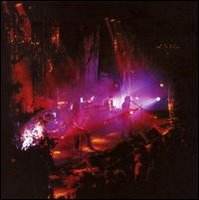
My Morning Jacket
Their nearly four hour Bonnaroo performance was the best live show I saw all year, nearly reaching the greatness of their rain-drenched 2004 performance. Their live Okonokos re-enforces the fact that they may be the best live band in the country right now. Plus, besides The Flaming Lips, they're the only band that can unite the hipsters and the hippies.
Best of 2006 Honorable Mention
The Be Good Tanyas - Hello Love

The first of a surprising number of Canadian acts on the list. A subtle blend of country, folk, bluegrass gospel and sublime vocal harmonies that make a quiet yet effective album.
Choice cuts: "A Thousand Tiny Pieces", "What Are They Doing In Heaven Today"
Sarah Harmer - I'm a Mountain

Harmer leaves AAC territory behind and heads towards a more rootsy approach. The bluegrass instrumentation and arrangements fit her vocal style just fine.
Choice cuts: "I'm a Mountain", "Will He Be Waiting For Me?"
Gomez - How We Operate

A little too polished at times but I think it's still a much better album than some reviews have said. Having seen them live twice in the past year, this material does have more vitality live, which is its greatest plus.
Choice cuts: "Hamoa Beach", "All Too Much"
Derek Trucks Band - Songlines

Bands that get labeled as "jambands" get stereotyped as being incapable of making solid studio albums. Trucks & co. are much more than a simple jamband and they prove it here, a enjoyable blend of blues, R&B, and traditional Pakistani music. And Derek Trucks may be the best slide guitar player on the planet.
Choice cuts: "Sahib Teri Bandi - Maki Madni", "Crow Jane"
Comets on Fire - Avatar

Proto-metal guitar fireworks, screeching vocals, lots of noise; it's the exact opposite of anything else on the list so far. Even though its noisy, the band can still get a serious groove going on "Sour Smoke." Still not the best Ethan Miller related project of the year however (more on that later).
Choice cuts: "Dogwood Rust", "Sour Smoke"
Built to Spill - You In Reverse

Overall, it may not be the best Built to Spill album, but it has its moments that made the wait worth it. "Conventional Wisdom" easily gets the award for guitar riff of the year.
Choice cuts: "Conventional Wisdom, "Liar"
Drive-By Truckers - A Blessing & A Curse

I don't think this comes anywhere close to the previous three albums, mostly because of the lack of stronger material from Mike Cooley and Jason Isbell. But the Truckers have proved they are more than just a "Southern Band."
Choice cuts: "Gravity's Gone", "Goodbye"
Neko Case - Fox Confessor Brings the Flood

The thing with Neko Case is that her exceptional voice always overshadows her songcraft. This albums has her strongest songs to day but it's still her voice that carries the album. The Sadies have added a distinctive foundation her sound that suits here just fine.
Choice cuts: "Margaret vs. Pauline", "Star Witness"
Califone - Roots & Crowns

One of the best discoveries I made this year was the genre that has been labeled 'alt-folk' or 'freak folk'. Califone seems to get lumped into this category but their music seems to go beyond that ridiculous category. These songs take a while to get into, but one you do, they continue to grow.
Choice cuts: "Spider's House", "The Orchids"
Brightblack Morning Light

Another 'freak folk' group that is re-inventing the neo-hippie aesthetic. No longer are hippies associated with jam bands; they can also create atmospheric, trippy music made for listening to in a cabin in the woods with a good amount of a certain weed. Also, this album has the best use of a Fender Rhodes I've heard in a long time.
Choice cuts: "A River Could Be Loved", "Come Another Rain Down"
Secret Machines - Ten Silver Drops

The Machines' second albums finds them greatly improving their songcraft as from start to finish, I think this is a stronger, more compact album of songs than their debut. While some may like the more spacey approach, I feel more concise songs greatly improve them.
Choice cuts: "Lightning Blue Eyes", "1000 Seconds"
Cold War Kids - Robbers & Cowards

One of those blog buzz bands that I happen to like quite a bit. Their appeal lies in intriguing vocals and disjointed melodies that sound new and yet have something old and familiar about them.
Choice cuts: "Hang Me Up to Dry", "Red Wine Success"
Lucero - Rebels, Rogues & Sworn Brothers

If your looking for plain and simple Alt-Country album, you're not going to find anything closer than Lucero. While their sound doesn't stray too far from the Uncle Tupelo template, this album finds them adding piano and accordion prominently to their sound. Not as good as Nobody's Darlings, but their willingness to expand their sound gets them credit.
Choice cuts: "San Francisco", "I Can Get Us Out of Here Tonight"
Biggest Disappointment of 2006


Ray LaMontagne - Until the Sun Turns Black / Damien Rice - 9
These albums aren't disappointments in that I think they are bad albums; they both have their strong points. The problem is that I loved each's debut so much that both these albums pale in comparison. I think no mater what each released, I was bound to be let down.
But still check out: Ray - "Empty", Damien - "Grey Room"
Live Band of 2006

My Morning Jacket
Their nearly four hour Bonnaroo performance was the best live show I saw all year, nearly reaching the greatness of their rain-drenched 2004 performance. Their live Okonokos re-enforces the fact that they may be the best live band in the country right now. Plus, besides The Flaming Lips, they're the only band that can unite the hipsters and the hippies.
Subscribe to:
Posts (Atom)